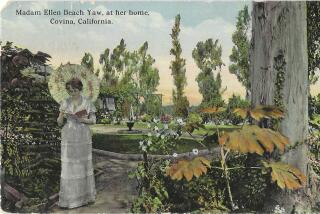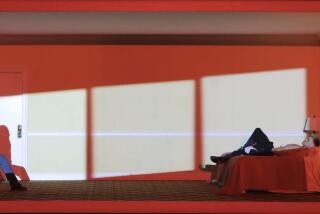MUSIC REVIEW : Soprano Faith Esham in Local Recital Debut
- Share via
By the time she ended her generous debut recital Monday night in Ambassador Auditorium, Faith Esham was beginning to sound like the genuine operatic personality she is.
But earlier, the singer from Kentucky, who has stage credits not only at both companies of Lincoln Center but from important European centers as well, took a long while to warm up. In the meantime, she may have mystified some of her listeners.
Esham’s soprano is an instrument of weight and flexibility, attractive sound if not abundant coloration. Her beginnings as a mezzo may account for the richness in the first octave, yet the freedom and beauty of her top notes are clearly native to the voice, not add-ons.
Still, and despite the fact that Esham is a veteran operatic performer--her appearance in the Gold Medal series was connected to her winning the Naumburg Competition in 1985--she is not an easily classifiable singer. Her ease at singing Gilda in New York City Opera’s “Rigoletto” in Orange County last week does not necessarily limit her to a few roles.
Esham’s recital, at which she was splendidly and sensitively assisted by pianist Armen Guzelimian--substituting on short notice for a sick colleague--indicated and underlined her clear versatility.
What was best came last. An expansive performer, Esham closed her program proper with four heroic Rachmaninoff songs, delivered with a full, lush tone and generosity of spirit.
Before that, she gave properly intimate, finely delineated performances of Poulenc’s late cycle, “La courte paille,” a great work of deceptive simplicity. A group of Wolf lieder offered outward charms, if no deep insights. But Esham’s well-projected response to the directness of four songs by Aaron Copland resulted in excitement on both sides of the proscenium.
More muffled in sound and less connected in legato passages, Esham began the program with Mozart’s scena and aria, “Misera! dove son,” and a group of five Schubert lieder that she had arranged into a faux cycle. The songs survived, but didn’t need the help.
Two encores were given: “Les chemins de l’amour” by Poulenc and the spiritual, “This Li’l Light of Mine.”
More to Read
The biggest entertainment stories
Get our big stories about Hollywood, film, television, music, arts, culture and more right in your inbox as soon as they publish.
You may occasionally receive promotional content from the Los Angeles Times.










